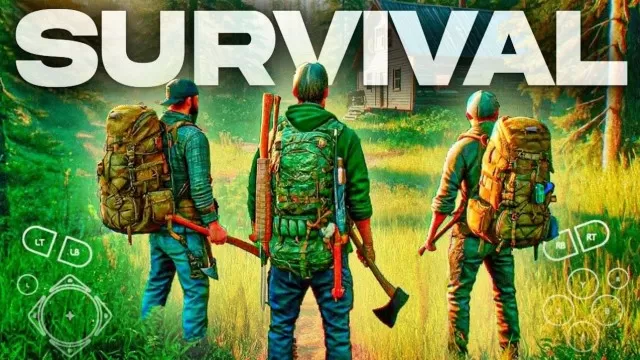Why Survival Games Tap Into Our Deepest Instincts

Sometimes it seems to me that the survival genre stands out from other games with its unique atmosphere. In these games, the player faces not only enemies but also basic needs — hunger, cold, and a lack of resources. This genre feels like a test of what we would do when left one-on-one with a harsh environment. At the same time, survival in a virtual world remarkably reflects our real instincts. That is why survival projects have remained popular for many years, resonating with a wide variety of players.
Struggle against nature and the elements
The first defining feature of the survival genre is the confrontation with nature. Games like The Forest, Green Hell, or Don’t Starve make players feel the fragility of human life: a single wrong decision can lead to hunger, illness, or death. You must gather resources, cook food, monitor your health, and at the same time arrange a safe place to sleep. Every detail matters: fail to light a fire and you freeze, ignore a poisonous plant and you lose strength.
This approach makes the gameplay tense, because the real enemy is the environment itself, not just monsters or other foes. The forest in The Forest or the jungles in Green Hell may look beautiful, but they are hostile: the player constantly feels that nature can punish any carelessness at any moment. This gives the genre a special depth, as the struggle is not only with external threats but also with internal limitations — fatigue, scarcity of resources, and poor decisions.
Interestingly, even esports media sometimes touch upon this theme: resources like egw.news write about how survival games influence our perception of competition and interaction. At its core, survival is always a test of endurance: who can adapt better, who can withstand pressure the longest.
In the end, the main idea is simple — humans always remain vulnerable to the elements, and that is precisely what makes the process so captivating. The survival genre reminds us that comfort and safety are not givens but the result of constant struggle.
Social dynamics
" alt="Games Social Dynamic" width="660" height="312">
The second important aspect of the survival genre is interaction between players. In Rust or DayZ, you can not only build bases and gather resources but also constantly face choices: share your loot with another player or, on the contrary, attack to take everything for yourself. This uncertainty makes the experience thrilling, since behind every corner there could be either an ally or an enemy. No script can predetermine these situations — they unfold in real time and create unique stories.
At the heart of such games lies the issue of trust. In a world where resources are always scarce, it is difficult to believe that a stranger is willing to help without expecting something in return. Many players tell stories of temporary alliances turning into betrayal, or the opposite — chance encounters evolving into long-lasting partnerships. Even industry reviews and news on sites like gaming news often highlight that these situations show how the survival genre tests not only one’s ability to endure but also the skill of building social connections, where the cost of a mistake can be very high.
It is no coincidence that the social factor is considered to make survival far more intense than the struggle against nature itself. Confrontation with the environment is important, but the unpredictability of dealing with other people creates a deeper and more emotionally charged experience. This takes survival games beyond a simple simulation of endurance and turns them into an exploration of human psychology, where every choice reflects real patterns of behavior under crisis conditions.
The instinct to create
Beyond struggle and competition, the survival genre also nurtures the instinct to create. In Minecraft or Terraria, players spend dozens, sometimes even hundreds of hours building, exploring, and expanding their space. Here, survival is no longer just about gathering resources — it becomes the process of transforming chaos into an ordered world. The player decides where to build a house, how to organize production, and what their small virtual world will look like.
This approach taps into deep human instincts: it’s important not only to preserve life but also to create an environment where living becomes easier and more comfortable. A bridge or a farm built in Minecraft is not just an in-game object but a symbol that humans can turn a wild and dangerous world into a safe space. It reflects a universal drive for development and control over one’s surroundings.
I believe this element is what gives the genre its longevity. It combines the instinct for self-preservation with the desire to create, turning survival into a genre where you can test your endurance and express your creativity at the same time. In the end, players return to these games again and again — not only for survival but also for the chance to leave their mark on a virtual world.
Tension and the feeling of reward
" alt="Feeling Reward" width="659" height="368">
Another reason for the popularity of survival games is the high level of tension that runs through the entire gameplay. When resources are scarce and danger lurks at every step, even the simplest action becomes a challenge. You have to decide: take the risk of going out at night in search of rare materials, or wait until morning, knowing that precious time might be lost. Every choice carries weight, and this is what creates a unique sense of immersion.
Every resource found, every house built, or every successful defense feels meaningful. In Subnautica, a single successful dive into the depths of the ocean becomes an event because it carries the risk of death and losing part of your progress. In ARK: Survival Evolved, raising a dinosaur or fortifying a base is the result of hours of hard work and struggle against circumstances. These victories cannot be called accidental — they are hard-earned, which is why they feel especially valuable.
I believe it is precisely this sense — that the result was achieved through one’s own efforts — that keeps players coming back to such worlds again and again. The survival genre teaches us to value small successes by turning them into major achievements. And in this lies a special kind of reward: the realization that every improvement, every victory is the outcome of persistence, strategy, and the ability to cope with stress.
Conclusion
For me, survival games are not just a genre but a reflection of human nature. They show how we behave under stress, scarcity, and uncertainty. At the same time, they allow us to safely experience what would be impossible in real life. And perhaps this is precisely why survival projects continue to remain relevant: they help us look inside ourselves and test how strong our survival instincts truly are.
Disclaimer
Possible11 is committed to complying with the Promotion and Regulation of Online Gaming Bill, 2025 in India, which prohibits all forms of real-money online gaming, including betting and fantasy sports. We do not promote, endorse, or engage with any betting apps, fantasy sports platforms, or real-money gaming services. Our platform is actively reviewing and removing all content related to betting and fantasy sports to align with the new regulations. We are transitioning to focus solely on providing sports news, live scores, player stats, and tournament updates for sports fans. All content on our website and app is now intended for informational purposes only. We appreciate your patience and understanding during this transition process.












Give Your Feedback